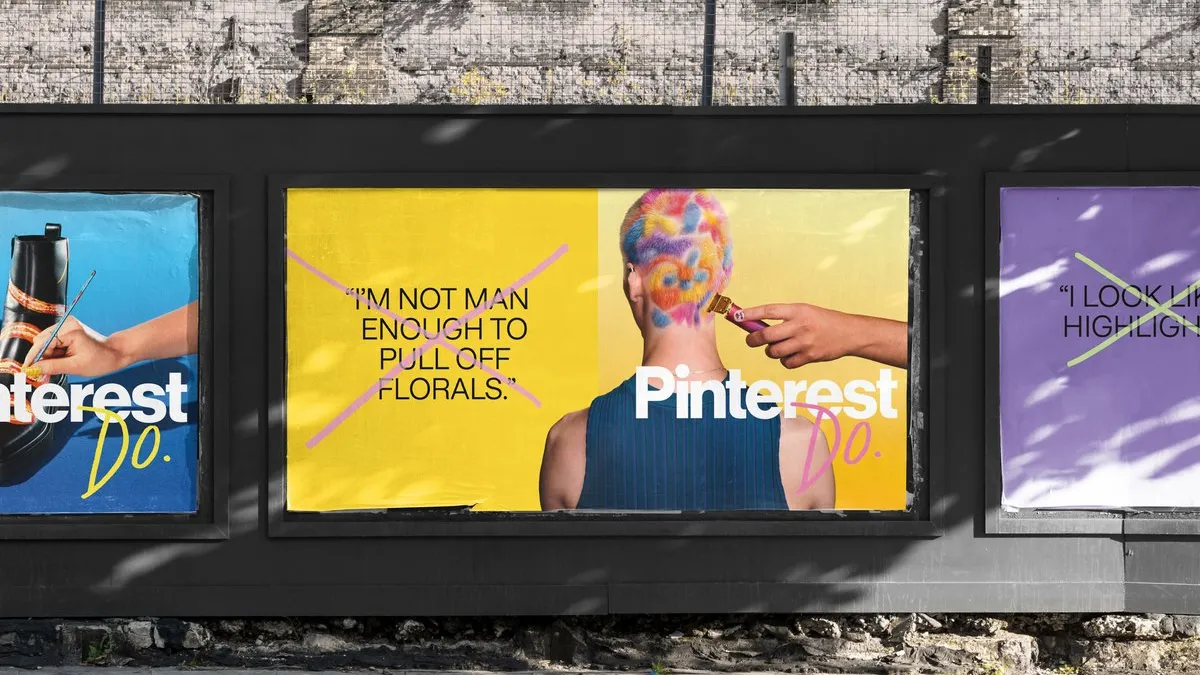Dive Brief:
-
Pinterest today (Sept. 12) launched its latest campaign, “Don’t Don’t Yourself,” according to details shared with Marketing Dive. The push markets the social media platform as accepting and ambition-driven, free of self-censorship and negativity.
-
The campaign includes five spots that will run across linear and connected TV (CTV) and cinema in the U.S., U.K. and Germany. It will also see additional activations across social media, out-of-home (OOH), digital out-of-home (DOOH) and creator partnerships.
-
The concept rides off research by agency Opinium and commissioned by Pinterest that reports 33% of Americans and 29% of British people rank fear of failure as the main concern when trying something new and follows a plethora of new technology additions on the platform.
Dive Insight:
Pinterest’s emotionally driven campaign comes at a time when social media is under fairly consistent scrutiny for its potentially negative impacts on mental health, often credited to its addictive nature. It also arrives following a plethora of new shopper and seller tools Pinterest has added to its platform. Inserting itself into the conversation around social media with a campaign with an emotional lure could help boost engagement for the platform following a period of middling results.
Developed in collaboration with Uncommon Creative Studio and global media agency MediaHub, “Don’t Don’t Yourself” features five 30-second spots, each targeting different happiness saboteurs like “Procrastination,” “Judgment,” “Fear of Failure,” “Inner Critic” and “Doomscrolling,” the coined term for obsessively consuming negative news and social media updates. In each, Pinterest rises up as the saving grace, inspiring consumers to step out of their comfort zone.
“We spend up to half of our waking time online, but more than ever, people say being online makes them feel disconnected from themselves and their interests,” said Andréa Mallard, Pinterest CMO, in the press release. “Our latest campaign highlights how Pinterest is a different side of the internet, where you can focus more on doing and less on viewing, where you can find what you love and forget about likes and where you can plan your life and try something new, free of judgment.”
Additional media strategy includes strategically placed OOH and DOOH activations in key locations like Penn Station in New York and Waterloo Station in London. The activations promote similar creative leaps as the campaign’s digital spots, and placing them in prime travel hubs could reach consumers at a point where they could be easily swayed. Social media content including media partnerships help round out the push.
The campaign will also see an experiential installation: “Escape the Doomscroll with Pinterest.” The event will take place in New York Oct. 7-9, timed to the lead up of World Mental Health Day on Oct. 10. Mental health and positivity has recently been a focus for the brand — in June, it launched its “We Belong Here” campaign timed to Pride Month, using research that suggested Pinterest is regarded as a positive platform.
“Don’t Don’t Yourself” follows a slew of technological features added to Pinterest recently as it looks to compete with other video apps, namely TikTok, as shoppable content rises in popularity. In June, it acquired artificial intelligence platform The Yes to personalize the e-commerce experience to consumers using their brand, style and size information. Last October, it launched Pinterest TV for consumers to shop live streamed videos. It’s also added new merchant features, including Pinterest API for Shopping, allowing sellers to manage their catalogs and metadata and a Videos in Catalog tool to create videos for those cataloged items.
Despite the new releases, Pinterest reported its slowest revenue growth in two years in August. Still, its second quarter revenue rose 9% from a year prior to $666 million and its app usage grew 8% worldwide. In June, Pinterest named Google’s former president of commerce Bill Ready as its new CEO, replacing co-founder and former CEO Ben Silbermann, a strategic move taken by the platform as it looks to bolster itself further as a social commerce destination.















